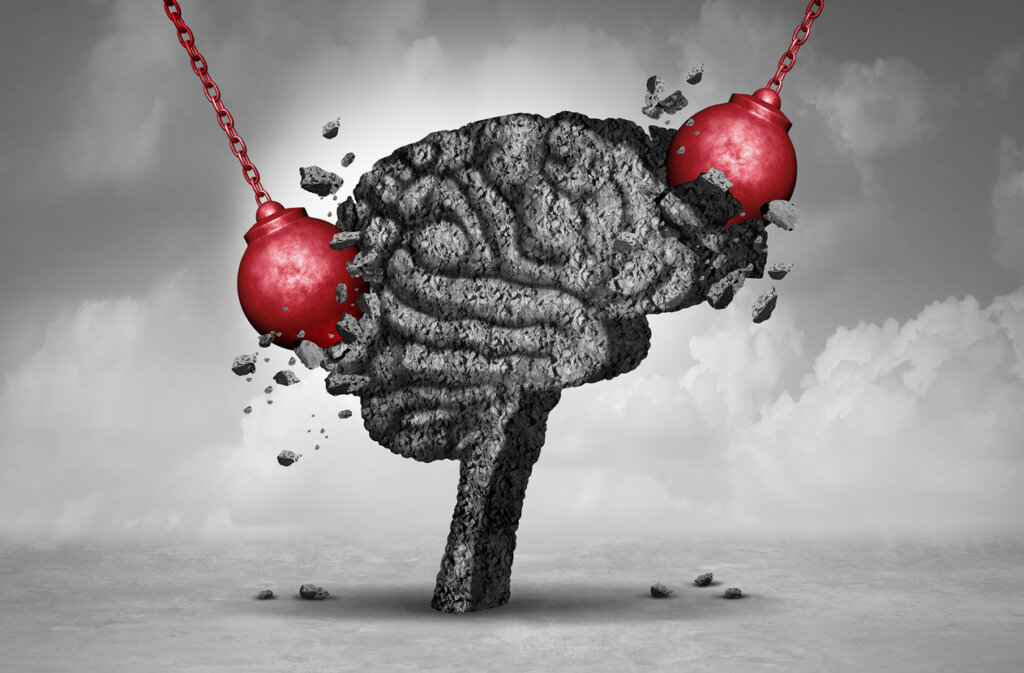A Hostile Personality is Linked to Increased Cognitive Impairment


Written and verified by the psychologist Valeria Sabater
How would you define hostility? Most of us have had the misfortune to meet someone with this type of behavior pattern. It’s usually the product of emotional mismanagement, poor reflective skills, and a low tolerance for frustration.
Those who show this personality profile usually end up experiencing mental health problems due to the pressure that their emotional circuitry has on their nervous system. As a rule, they view all the situations they encounter as unpleasant. This constant conflict with their environment and with life itself usually leaves behind more than one difficulty at the neurological level.
Today, experts claim that individuals who score high on hostility, cynicism, and negativity are at increased risk for cognitive problems as well as dementia. It seems these problems are triggered by poor coping abilities in handling stress.
There are many triggers behind hostile behavior. However, the health effects of this behavior aren’t often discussed.

A hostile personality and temperament damages the brain
We know that dementia is a disease that can appear in anyone. It does so regardless of gender, social class, or whether we’re good or bad people. Indeed, realities as harsh as Alzheimer’s don’t discriminate. Nor can they be foreseen. That said, we know that there are factors that can increase the probability of suffering from these conditions.
Along similar lines, if an adolescent demonstrates a hostile personality and it continues until adulthood, it’s more likely that they’ll suffer from cognitive impairment and dementia. This is explained in a study conducted by Dr. Lenore J. Launer, a member of the American Academy of Neurology.
Until recently, such conclusions were somewhat controversial. They imply assuming that our way of being and our temperaments are linked to a greater risk of suffering from certain diseases. Dr. Launer’s study has demonstrated this link. So much so that, in a sample of 3,126 25-year-olds, those who had hostile personalities suffered from memory problems by the age of 50. How is this phenomenon explained?
The individual with a violent and hostile character accumulates high anger and frustration. This inability to manage their emotions ends up affecting their cognitive functions.
Stress and repressed anger: enemies for brain health
What lies behind the hostile personality? As a rule, there are multiple variables responsible for this behavioral pattern. For example, genetics, social learning, and even psychological disorders. However, something that’s always apparent in these individuals is poor stress management and feelings of permanent anger.
This poor emotional regulation leads to states of paranoia and depressive disorders. If an adolescent is raised in a dysfunctional family and a clearly hostile social environment, it’s highly likely that they’ll develop a conflictive, defiant, cynical, and even violent personality.
These chaotic dimensions translate into a state of permanent stress that alters the brain network. Cortisol levels are always high. This has a serious impact on areas such as the prefrontal cortex or the hippocampus. These areas are related to memory and executive functions.

Can the individual displaying hostile behavior change?
When we think of an individual with a hostile personality, the first thing that comes to mind is the need to get away from them. Indeed, as a rule, these people bring trouble and harm and leave a trail of discomfort and unrest in their wake. It’s difficult to live or work with them or even have them as neighbors.
However, it’s a good idea to ask ourselves what can be done to help them. For instance, imagine an adolescent who comes from an adverse and problematic psychosocial context. What mechanisms could be developed to give them a better quality of life? After all, it can’t be ignored that the hostile individual is doomed to loneliness and social ostracism. A fact that further intensifies the risk of diseases and psychological disorders.
Self-awareness: the first step to deactivating problem behavior
One feeling that eats away at this kind of personality is anger. In fact, anyone who gets carried away by this emotion is doing so to channel and hide a deep pain. There might be a past of abuse, a situation of abandonment, or a continued experience of failure and social maladjustment. This all leads to feelings of discomfort and constant anger. But lying underneath is a wound.
The hostile personality needs psychological therapy to help them address their internal wounds. Thus, the most important step for them to take is to develop adequate self-awareness. They must learn to make contact with their internal needs and with the chaotic tangle of their emotions.
On the other hand, it’s also important to offer them strategies to regulate their impulses and manage stress. A healthy brain is a brain that masters self-control and understands its emotions so they work in its favor and it doesn’t get carried away by them. Through these skills and deep therapeutic work, it’s possible to gradually reduce this hurtful hostility.
We all, in some way, have the same probability of suffering from cognitive impairment and dementia. However, there are certain factors that increase the risk. One of them is, without a doubt, personality. So, make sure you take care of your emotions, practice self-awareness, and regulate that voracious but silent enemy; stress.
How would you define hostility? Most of us have had the misfortune to meet someone with this type of behavior pattern. It’s usually the product of emotional mismanagement, poor reflective skills, and a low tolerance for frustration.
Those who show this personality profile usually end up experiencing mental health problems due to the pressure that their emotional circuitry has on their nervous system. As a rule, they view all the situations they encounter as unpleasant. This constant conflict with their environment and with life itself usually leaves behind more than one difficulty at the neurological level.
Today, experts claim that individuals who score high on hostility, cynicism, and negativity are at increased risk for cognitive problems as well as dementia. It seems these problems are triggered by poor coping abilities in handling stress.
There are many triggers behind hostile behavior. However, the health effects of this behavior aren’t often discussed.

A hostile personality and temperament damages the brain
We know that dementia is a disease that can appear in anyone. It does so regardless of gender, social class, or whether we’re good or bad people. Indeed, realities as harsh as Alzheimer’s don’t discriminate. Nor can they be foreseen. That said, we know that there are factors that can increase the probability of suffering from these conditions.
Along similar lines, if an adolescent demonstrates a hostile personality and it continues until adulthood, it’s more likely that they’ll suffer from cognitive impairment and dementia. This is explained in a study conducted by Dr. Lenore J. Launer, a member of the American Academy of Neurology.
Until recently, such conclusions were somewhat controversial. They imply assuming that our way of being and our temperaments are linked to a greater risk of suffering from certain diseases. Dr. Launer’s study has demonstrated this link. So much so that, in a sample of 3,126 25-year-olds, those who had hostile personalities suffered from memory problems by the age of 50. How is this phenomenon explained?
The individual with a violent and hostile character accumulates high anger and frustration. This inability to manage their emotions ends up affecting their cognitive functions.
Stress and repressed anger: enemies for brain health
What lies behind the hostile personality? As a rule, there are multiple variables responsible for this behavioral pattern. For example, genetics, social learning, and even psychological disorders. However, something that’s always apparent in these individuals is poor stress management and feelings of permanent anger.
This poor emotional regulation leads to states of paranoia and depressive disorders. If an adolescent is raised in a dysfunctional family and a clearly hostile social environment, it’s highly likely that they’ll develop a conflictive, defiant, cynical, and even violent personality.
These chaotic dimensions translate into a state of permanent stress that alters the brain network. Cortisol levels are always high. This has a serious impact on areas such as the prefrontal cortex or the hippocampus. These areas are related to memory and executive functions.

Can the individual displaying hostile behavior change?
When we think of an individual with a hostile personality, the first thing that comes to mind is the need to get away from them. Indeed, as a rule, these people bring trouble and harm and leave a trail of discomfort and unrest in their wake. It’s difficult to live or work with them or even have them as neighbors.
However, it’s a good idea to ask ourselves what can be done to help them. For instance, imagine an adolescent who comes from an adverse and problematic psychosocial context. What mechanisms could be developed to give them a better quality of life? After all, it can’t be ignored that the hostile individual is doomed to loneliness and social ostracism. A fact that further intensifies the risk of diseases and psychological disorders.
Self-awareness: the first step to deactivating problem behavior
One feeling that eats away at this kind of personality is anger. In fact, anyone who gets carried away by this emotion is doing so to channel and hide a deep pain. There might be a past of abuse, a situation of abandonment, or a continued experience of failure and social maladjustment. This all leads to feelings of discomfort and constant anger. But lying underneath is a wound.
The hostile personality needs psychological therapy to help them address their internal wounds. Thus, the most important step for them to take is to develop adequate self-awareness. They must learn to make contact with their internal needs and with the chaotic tangle of their emotions.
On the other hand, it’s also important to offer them strategies to regulate their impulses and manage stress. A healthy brain is a brain that masters self-control and understands its emotions so they work in its favor and it doesn’t get carried away by them. Through these skills and deep therapeutic work, it’s possible to gradually reduce this hurtful hostility.
We all, in some way, have the same probability of suffering from cognitive impairment and dementia. However, there are certain factors that increase the risk. One of them is, without a doubt, personality. So, make sure you take care of your emotions, practice self-awareness, and regulate that voracious but silent enemy; stress.
All cited sources were thoroughly reviewed by our team to ensure their quality, reliability, currency, and validity. The bibliography of this article was considered reliable and of academic or scientific accuracy.
- L. R. White, S. D. Edland, L. S. Hemmy, K. S. Montine, C. Zarow, J. A. Sonnen, J. H. Uyehara-Lock, R. P. Gelber, G. W. Ross, H. Petrovitch, K. H. Masaki, K. O. Lim, L. J. Launer, T. J. Montine. Neuropathologic comorbidity and cognitive impairment in the Nun and Honolulu-Asia Aging Studies. Neurology, 2016; DOI: 10.1212/WNL.0000000000002480
- Terracciano A, Stephan Y, Luchetti M, Albanese E, Sutin AR. Personality traits and risk of cognitive impairment and dementia. J Psychiatr Res. 2017 Jun;89:22-27. doi: 10.1016/j.jpsychires.2017.01.011. Epub 2017 Jan 22. PMID: 28153642; PMCID: PMC5374012.
This text is provided for informational purposes only and does not replace consultation with a professional. If in doubt, consult your specialist.







